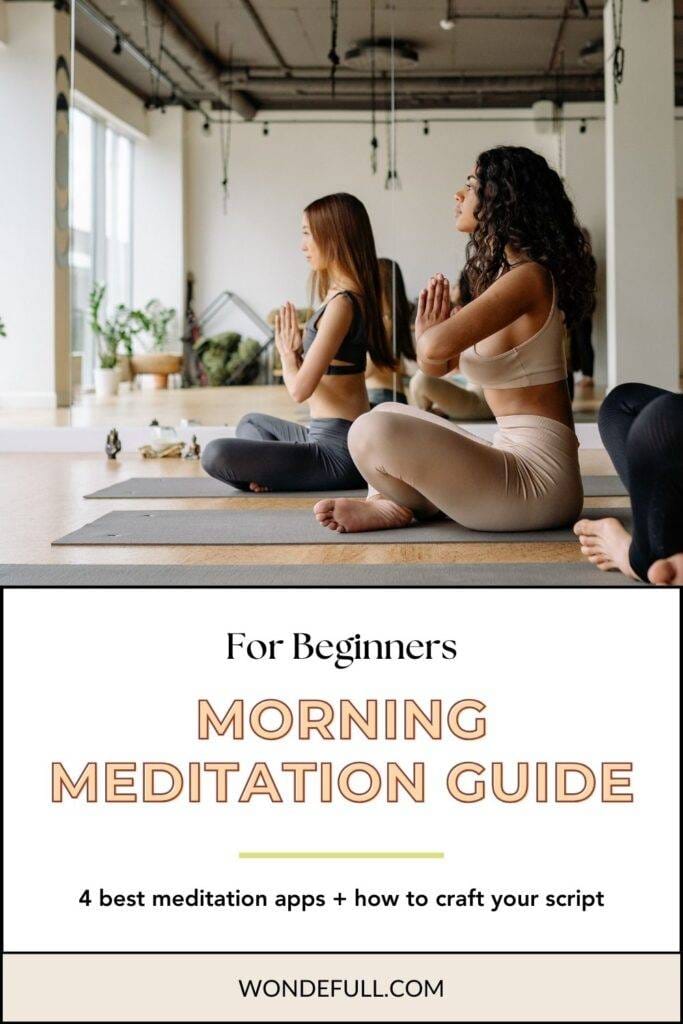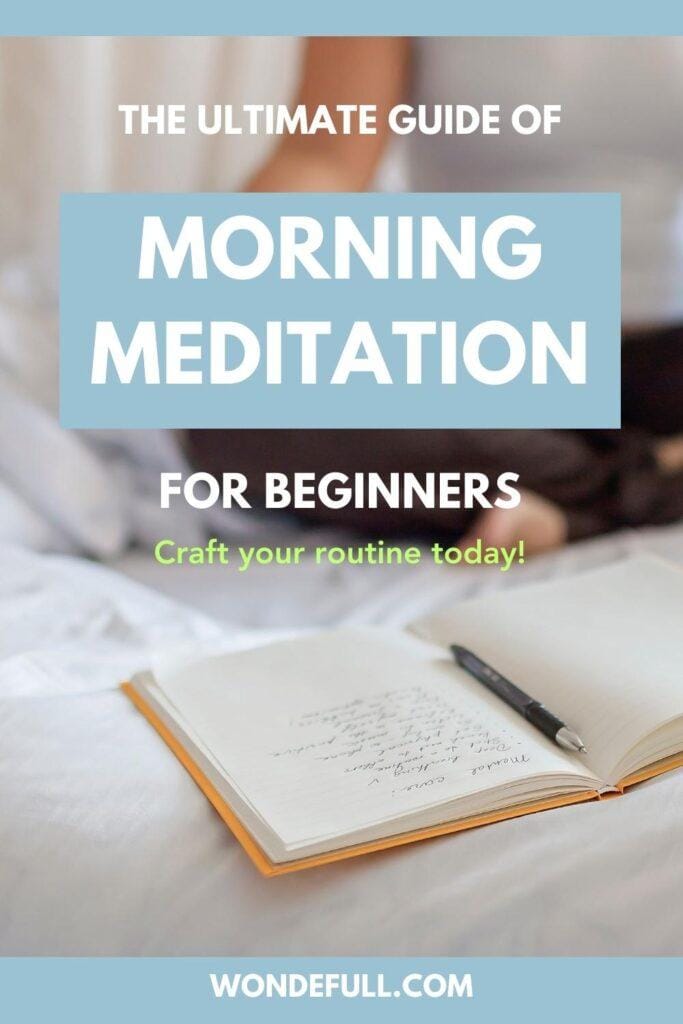You’ve heard about the benefits of morning meditation, but you lack the motivation and are not sure where to begin. As someone who has used various morning meditation apps and listened to popular guided meditations on platforms like Spotify and YouTube, I now alternate between these resources and my own morning meditation scripts. In this article, I’ll guide you through the world of morning meditation to help you get started. If you think crafting your own morning meditation script suits you better, there will be a step-by-step guide with some available scripts to inspire your practice.
What is morning meditation?
Meditation is the intentional practice of spending time alone with ourselves. We set aside moments in our busy days to focus on our breath, body, mind, and the present moment. This act of self-compassion and self-care enhances our well-being and productivity.
Morning meditation is a practice that takes place shortly after waking up, before you begin your day, whether that involves going to school, work, or preparing breakfast for your kids. You can decide how much time you want to spend on morning meditation, ranging from 5 minutes to 1 hour. For beginners, it’s advisable to start with just 5 to 10 minutes of meditation.
Why meditate in the morning?
When you wake up early to meditate, you’re setting yourself up for a better day. I’ve been meditating in the morning for the past few months, and even though I haven’t been consistent, I still experience benefits like increased positive energy, improved focus, and greater stamina throughout the day. The love, abundance, and gratitude that I embodied during my morning meditation helped me navigate obstacles later in the day with greater ease and savor the positive moments more. In fact, I attract more good things in life now!
Here are six proven benefits of a daily morning meditation practice to help you start and integrate it into your morning routine:
- Enhanced focus and clarity. Meditation, which involves body scanning and shifting focus from your breath to your mind and surroundings, has been shown to reduce unwanted distractions from pain and stress, resulting in improved focus.
- Elevated mood. While reflecting on what we have and imagining the future we want, our mood is elevated. With a more positive mindset and mood, we can approach the challenges of our day with greater ease.
- Enhance your awareness. When we are meditating, we are forced to be with our thoughts without escape. It is a time needed for self-awareness and self-compassion, helping us understand who we are and who we aspire to become.
- Quicker manifestation through Alpha brain waves. Manifestation works the fastest when the door to the subconscious mind opens, with our brain functioning in Alpha brain waves. This occurs as you are just awakening and still in a slightly dreamy state. Therefore, it’s best to practice meditation either before you go to bed at night or when you wake up in the morning.
- Improve confidence. Through meditation, gaining a clearer understanding of yourself leads to increased confidence and self-esteem. This newfound confidence empowers you to overcome obstacles in pursuit of your life’s purpose.
- Boost empathy and compassion. The way we perceive others often mirrors our self-perception. Therefore, as we connect more deeply with ourselves during meditation, we also improve our ability to connect with others.
What is the best time to do morning meditation?
It’s optimal to meditate when most people are still asleep, as the environment tends to be quiet, enabling you to enter a deep meditative state more easily. Depending on factors like your family and neighborhood, this time frame could range from 4 to 8 am.
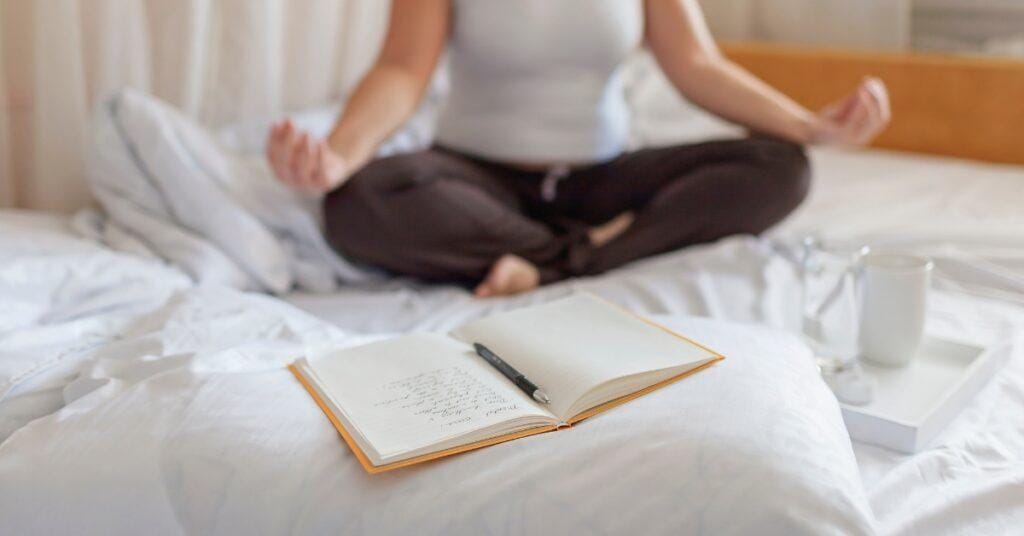
Guided vs. self-guided meditation?
How do you know which is better for you: guided meditation with a teacher or an app; or meditation on your own?
If you are experienced in meditation, you might find minimal need for guidance. But until you get to a point when guided meditation just isn’t helpful or necessary, it can be incredibly useful to have someone giving you instructions as you meditate.
If any of the following apply to you, guided meditation might be the better option:
- You are a beginner or novice in meditation
- You are anxious or stressed out
- Your mind tends to be busy and restless.
- You want to learn a new meditation technique
4 best guided morning meditation apps
If you’re interested in exploring more guided meditation and delving deeper into spirituality and mindfulness, consider checking out the following apps. I have tested them all and my personal favorite is Insight Timer as it combines mindful and spiritual practices into one app.
1. Waking Up
Other than guided meditation from Sam Harris and other leading teachers, Waking Up offers thought-provoking conversations and lessons on life. If you’re keen on grasping the essentials and purpose of mindfulness, this app is a must-try. Currently, it has a free 30-Day Trial, and also a partial scholarship for those who need it.
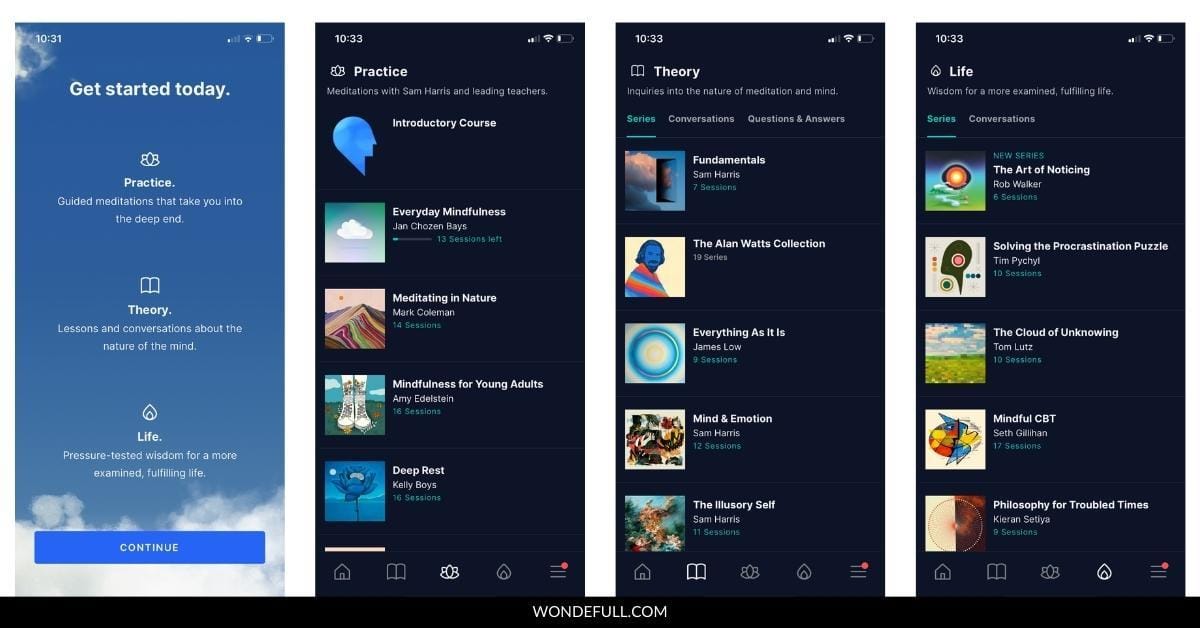
2. Insight Timer
Insight Timer is the app to help you create a well-being routine that works for you beyond meditation. It covers five aspects: timer, meditation, breathwork, yoga, journaling, and mood check-in. Best of all, it’s FREE! While there are paid upgrades available, the free resources they offer are typically sufficient for beginners.
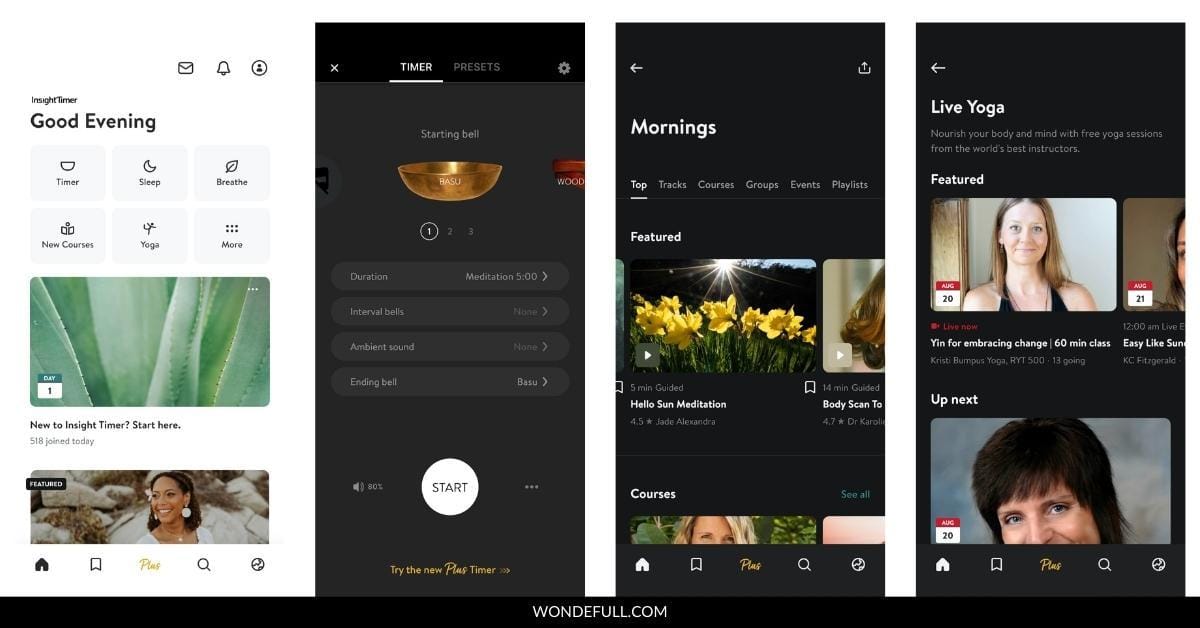
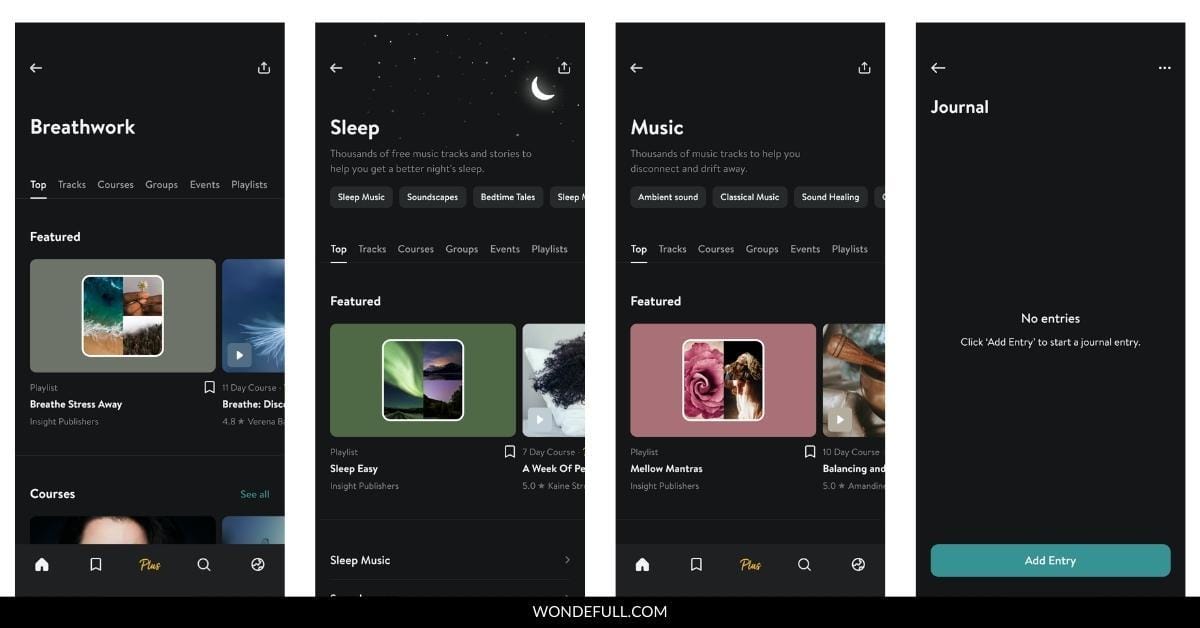
3. Headspace
The most popular meditation app that has been around since 2012. Founded by Andy Puddicombe who is a former Buddhist monk, the app is very focused on teaching beginners how to meditate, the guides on their website are also worth checking out. In addition to guided meditation, Headspace offers sleep sounds, wind-down exercises, relaxing yoga, focus music playlists, and more.
However, Headspace only offers a 14-day free trial if you subscribe to the annual package and a 7-day free trial if you opt for the monthly package. However, if you are a post-secondary program or university student, you will be eligible for 85% off through their education plan.
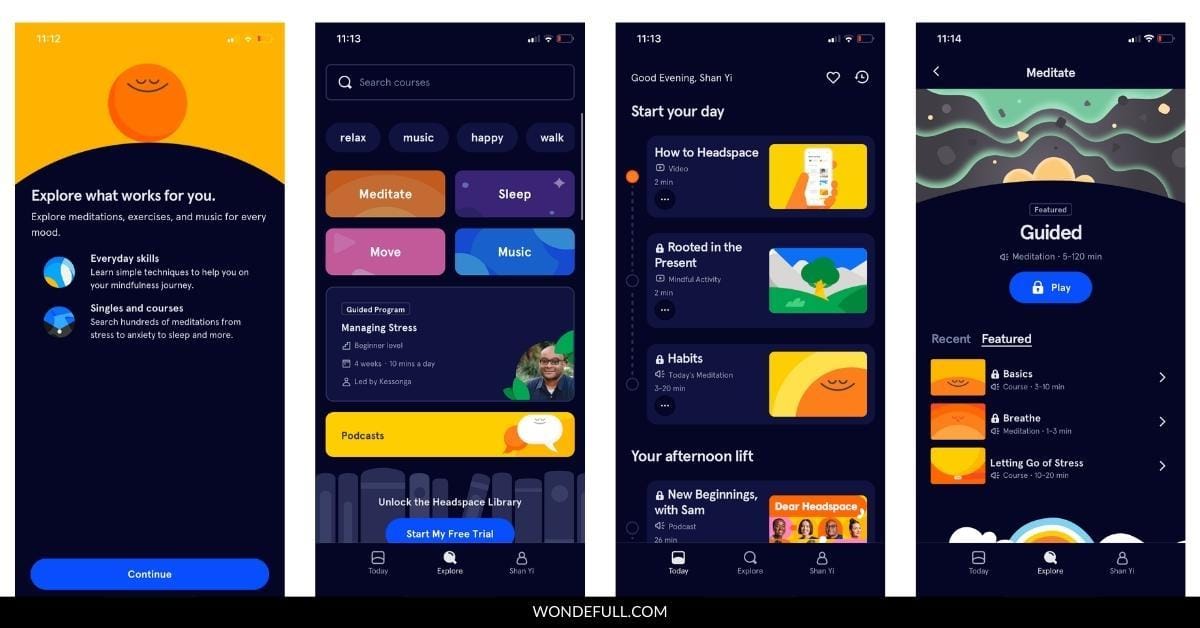
4. Calm
Calm is focused on helping people to sleep, soothe the nervous system, and relieve anxiety and stress through guided meditation, soundscapes, music, wisdom sharing from world-class mindfulness experts, bedtime stories, and more. If you are looking for an app to help you unwind your overwhelmed mind, this could be the one. You can try out Calm with a 7-day free trial.
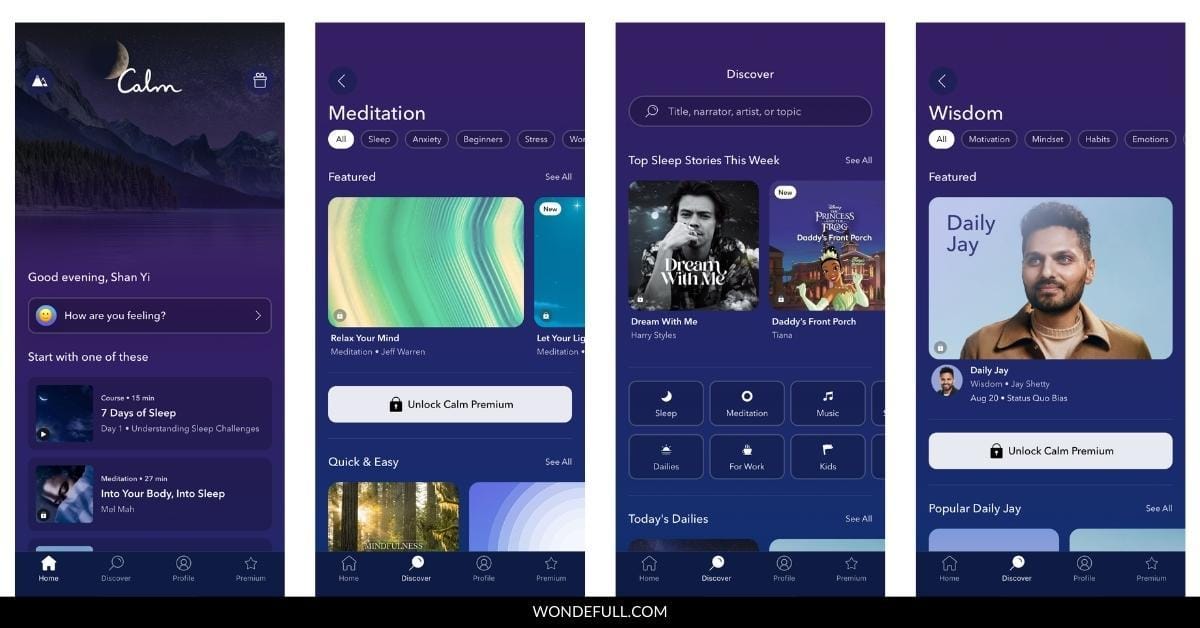
How to craft your own morning meditation script
If you choose to get started with self-guided meditation, here’s a step-by-step guide on how to craft your own morning meditation script.
1. Set the duration and internal
Determine the length of your meditation. If it goes beyond 5 minutes, consider using a bell timer to help you stay on track. I personally recommend Insight Timer, a free app.
2. Be clear about the goal of your practice
Having a clear intention is vital to make the most of your meditation. There are various goals you can set for your practice, including:
- Cultivating mindfulness
- Gain clarity and focus
- Self-discovery
- Reinvent yourself
- Manifestation
- Relieve stress
- Cope with negative emotions
- Wind down before sleep
- Practice gratitude and many more!
3. Choose a technique(s)
One of the great things about meditation is that they’re adaptable to different individual needs and lifestyles. Explore and select techniques that resonate with you to kickstart your day with a sense of well-being.
4. End it with affirmation and gratitude
Always practice gratitude and affirmation at the end of your morning meditation script. This helps raise your vibration, aligning with the law of attraction – where like attracts like. If you are full of light, you will attract luck.
5. Record with music or silence
With your meditation goals and techniques in mind, begin recording with your script . If you prefer calming background music, you could easily find the options on YouTube or the aforementioned apps.
6. Practice with compassion
Recognize that this might be your first experience, and approach it with compassion. If your mind wanders, gently bring it back without judgment. Building focus takes time. When you finish, open your eyes and take in your surroundings. Allow yourself a moment to adjust, and thank yourself for making time to meditate.
Morning meditation scripts for inspiration:
It’s not easy to come up with a morning meditation script if you have not practiced it long enough. Don’t beat yourself up if you face blockers, here are some scripts to inspire you:
- Guided Morning Meditation [15-Minute Meditation] by Thrive Global
- 10-Minute Guided Morning Meditation by Cynthia Sageleaf
- 10 Minutes of Presence Morning Meditation | Morning Meditation for Women
- Morning Meditation for Positivity, Resilience and Presence by The OM Collective
- Guided Morning Meditation: Script + Audio (Free 10 & 20 min. Meditation) by Selffa
How to stick with your morning meditation habit
The key to successfully forming it as a habit is to start small, with just 5 minutes of morning meditation 2-3 days a week. Once you experience the benefits firsthand, you can gradually increase the duration and frequency.
If you wish to challenge yourself more, set a goal and reward yourself upon achieving it. Another useful strategy is to maintain a meditation journal, recording observations and insights from each session while tracking your progress. This not only keeps you motivated but also ensures that your meditation remains intentional, allowing you to improve your practice each time.
Morning meditation is worth the try
There’s a reason why meditation practices have lasted for hundreds of years, similar to books – they have transformed lives. However, the time at which you choose to meditate plays a role in how much you benefit. It provides the best results when practiced after you wake up and before you go to bed.
When you wake up the following day, try dedicating as little as five minutes to meditating. The least you can gain is five minutes of self-care time. Through consistent meditation practice, you will gain life wisdom from within yourself.
Like this post? Share it on Pinterest – thank you!
